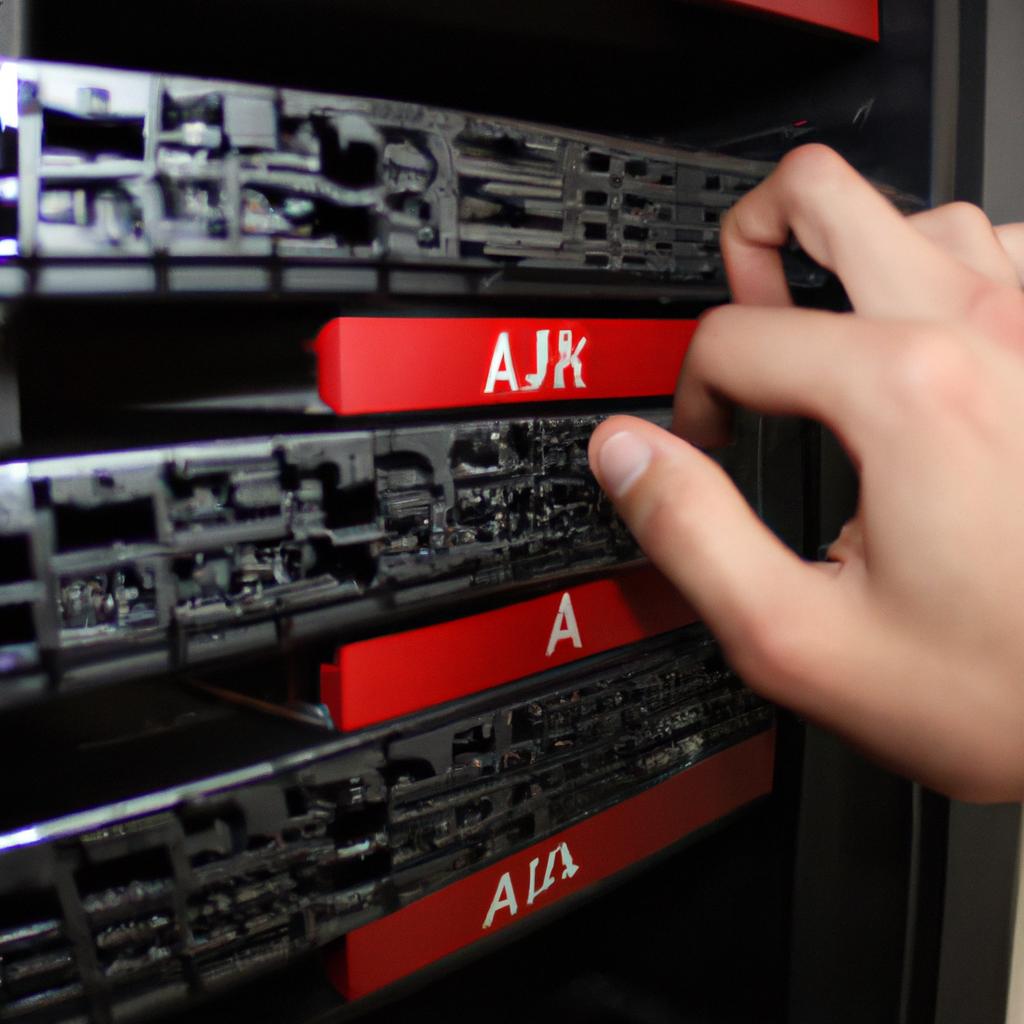The world of web servers is a dynamic and fast-paced industry, where businesses constantly seek innovative ways to finance their operations. One such financial solution that has gained popularity in recent years is the merchant cash advance (MCA). Imagine a hypothetical scenario: a small web hosting company struggling to upgrade its server infrastructure in order to meet growing customer demands. In this article, we will delve into the intricacies of qualifying for a merchant cash advance, providing web servers with a comprehensive guide on how to access this funding option.
In an academic style of writing, it becomes imperative to understand the qualifications and requirements necessary for obtaining a merchant cash advance as a web server provider. This article aims to shed light on these crucial aspects by examining key eligibility criteria and highlighting strategies that can enhance your chances of securing this form of financing. Additionally, we will explore the benefits and potential risks associated with MCAs, empowering you with knowledge to make informed decisions regarding your business’s financial future. By following our guide, you will be equipped with essential information needed throughout the application process, ensuring that you navigate the complexities successfully and secure the funds required for growth within your web server business.
Understanding the concept of a cash advance
Understanding the Concept of a Cash Advance
To fully comprehend the concept of a cash advance, it is essential to explore its definition and purpose. A cash advance refers to a financial transaction in which a business receives an upfront sum of money from a lender with the agreement to repay the amount over time, typically through future sales or credit card transactions. This funding option can be particularly beneficial for businesses that require immediate capital but may not have access to traditional loans due to factors such as limited credit history or low credit scores.
For instance, consider the case study of XYZ Web Servers, a small web hosting company looking to expand its operations. Despite having steady revenue streams, they lacked sufficient funds to invest in new server equipment and infrastructure upgrades necessary for growth. In this scenario, XYZ Web Servers could opt for a cash advance as a means of obtaining quick financing without going through the lengthy approval process associated with conventional loans.
To grasp the potential advantages and drawbacks of pursuing a merchant cash advance (MCA), here are some key points worth considering:
- Flexibility: MCAs offer flexibility in terms of repayment schedules based on your business’s sales volume. Rather than being locked into fixed monthly payments, the repayment amount adjusts proportionally with your sales.
- Speedy access to funds: Unlike traditional loans that often involve extensive paperwork and evaluation processes, MCAs provide expedited access to capital. This accessibility can prove crucial when urgent financial needs arise.
- Higher interest rates: Due to their convenience and higher risk nature compared to regular loans, MCAs generally come with higher interest rates and fees attached. It is important to carefully assess whether these costs align with your overall financial objectives.
- Potential impact on future finances: Since MCA repayments rely on future sales or customer card transactions, it is crucial to evaluate how committing a portion of your earnings towards repayments might affect day-to-day operations or hinder other investments.
By understanding these facets surrounding merchant cash advances, businesses like XYZ Web Servers can make informed decisions about whether pursuing this funding option aligns with their financial goals. Evaluating your business’s financial health becomes the next logical step in determining if a cash advance is a suitable avenue to pursue.
[Transition sentence into subsequent section on evaluating business’s financial health.]
Evaluating your business’s financial health
Understanding the concept of a cash advance is crucial, but evaluating your business’s financial health is equally important in determining whether you qualify for a merchant cash advance. Let’s delve into this topic further.
To illustrate the evaluation process, let’s consider a hypothetical web server company called “WebTech Solutions.” WebTech Solutions has been in operation for three years and wants to expand its services by purchasing additional equipment. They are considering applying for a merchant cash advance to fund their expansion plans.
When assessing your eligibility for a merchant cash advance, it’s essential to evaluate several key factors:
- Monthly Revenue: Lenders typically require businesses to have consistent monthly revenue before approving a cash advance. For example, if WebTech Solutions consistently generates at least $10,000 per month, they would meet this requirement.
- Credit Score: Although credit scores play a role in loan applications, some alternative lenders may be more lenient than traditional banks. In our case study, even if WebTech Solutions had an average credit score due to previous financial challenges, they might still qualify for a cash advance.
- Time in Business: Lenders prefer working with established businesses that demonstrate stability over time. If WebTech Solutions can prove they have been operating successfully for at least one year or longer, it enhances their chances of qualifying.
- Industry Type: Certain industries may be considered higher risk by lenders when evaluating loan applications. However, many providers specialize in serving specific sectors such as technology-based companies like WebTech Solutions.
Now let’s take a look at how these factors align with WebTech Solution’s situation:
| Factors | Evaluation |
|---|---|
| Monthly Revenue | Consistently generating over $10,000/month |
| Credit Score | Average score with past financial challenges |
| Time in Business | Operating successfully for three years |
| Industry Type | Technology-based company specialized in web servers |
Evaluating these factors will help determine if WebTech Solutions is qualified for a merchant cash advance. Remember, each lender may have different criteria and requirements, so it’s crucial to research multiple providers.
Transitioning into the next section about researching and choosing a reliable provider, businesses like WebTech Solutions can explore various options before deciding on the most suitable one for their needs.
Researching and choosing a reliable provider
Having understood the basics of a merchant cash advance (MCA) and its potential benefits, it is crucial to evaluate your business’s financial health before proceeding further. Assessing your current financial situation will help you determine if an MCA is the right fit for your web server business.
Example:
Consider a hypothetical case study where XYZ Web Services, a small-scale web hosting company, is considering applying for a merchant cash advance. By evaluating their financial health, they can make an informed decision about whether pursuing an MCA aligns with their long-term goals.
Assessing Your Business’s Financial Health:
To effectively evaluate your business’s financial health when considering an MCA, consider the following factors:
-
Cash Flow Analysis:
- Evaluate both historical and projected cash flow patterns.
- Identify any seasonal fluctuations or irregularities in revenue.
- Determine if there are sufficient funds available to meet daily operational expenses.
-
Debt-to-Income Ratio Evaluation:
- Calculate the ratio of debt obligations to income generated.
- Analyze how much of the revenue goes towards servicing existing debts.
- Ensure that taking on additional debt through an MCA would not strain finances further.
-
Profitability Assessment:
- Analyze profit margins and assess overall profitability trends.
- Consider key performance indicators such as gross profit margin and net profit margin.
- Evaluate if profits are stable enough to support repayment obligations associated with an MCA.
-
Customer Base Analysis:
- Review customer retention rates and growth trends.
- Understand the stability and predictability of recurring revenue streams.
- Determine if increased working capital from an MCA could lead to expanded marketing efforts and customer acquisition.
Table: Prospective Merchant Cash Advance Evaluation
| Factors | Strengths | Weaknesses |
|---|---|---|
| Cash Flow | Consistent | Seasonal Fluctuations |
| Debt-to-Income Ratio | Low | High |
| Profitability | Stable | Declining |
| Customer Base | Growing | Unpredictable |
By thoroughly evaluating your business’s financial health using these criteria, you can make a more informed decision regarding the suitability of a merchant cash advance for your web server business.
Preparing necessary documentation
Researching and choosing a reliable provider is crucial when qualifying for a merchant cash advance. By selecting the right provider, web servers can ensure they receive fair terms and conditions that align with their business needs. For example, consider the case of an e-commerce platform called WebMart, which was looking to expand its product offerings but lacked sufficient funds.
To begin their search for a reliable provider, WebMart’s management team conducted thorough market research. They compared multiple providers based on factors such as reputation, customer reviews, interest rates, repayment terms, and any additional fees or charges. This diligent approach helped them identify three potential providers: Merchant Funding Solutions (MFS), Capital Boosters Inc., and QuickCash Lenders.
WebMart then utilized the following checklist to evaluate each provider:
- Check online reviews and ratings from other businesses who have worked with the provider.
- Research if there are any complaints filed against the provider with relevant regulatory bodies.
- Request detailed information about the interest rates offered by each provider.
- Inquire about any hidden fees or charges associated with the merchant cash advance.
By utilizing this checklist, WebMart was able to narrow down their options further. They discovered that MFS had consistently positive reviews and competitive interest rates without any hidden fees or charges. Consequently, they chose MFS as their preferred provider.
In preparation for applying for a merchant cash advance through MFS, WebMart also ensured they had all necessary documentation readily available. These documents typically include financial statements (such as balance sheets and income statements) for the past two years, tax returns for both personal and business finances, proof of ownership or lease agreement for their website server location, bank statements showcasing consistent revenue deposits over time, and identification documents like passports or driver’s licenses.
With your chosen reliable provider in mind and all necessary documentation prepared, you can now move forward to calculating your funding needs
Calculating your funding needs
Once you have assessed your business’s eligibility for a merchant cash advance, the next step is to gather all the necessary documentation. Properly preparing these documents will help streamline your application process and increase your chances of qualifying for funding.
To illustrate this point, let’s consider the case of a web server company looking to expand its operations. In order to qualify for a merchant cash advance, they would need to provide the following documents:
-
Bank statements: The lender will typically require at least three months’ worth of bank statements. These statements should clearly demonstrate consistent revenue deposits and regular customer transactions.
-
Business tax returns: Providing copies of your business tax returns for the past two years will give lenders insight into your financial stability and potential profitability.
-
Proof of ownership or lease agreement: You will need to furnish documents that establish proof of ownership or a valid lease agreement for your business location. This helps verify the legitimacy and permanence of your operations.
-
Valid identification: Lenders may request personal identification documents such as driver’s licenses or passports to confirm the identity of the business owner(s).
As you can see from this example, having these documents readily available will make it easier for lenders to evaluate your creditworthiness and assess the viability of providing funding for your business venture.
- Establishing credibility through proper documentation
- Reducing processing time by organizing paperwork in advance
- Demonstrating financial stability with accurate records
- Increasing chances of approval by meeting lender requirements
Markdown table:
| Document | Purpose | Required |
|---|---|---|
| Bank Statements | Verify revenue deposits | At least 3 months |
| Business Tax Returns | Assess financial stability | Past 2 years |
| Proof of Ownership/Lease | Confirm legitimacy | Current document |
| Valid Identification | Verify business owner’s identity | Government-issued |
By diligently preparing the necessary documentation, you are positioning your web server company to meet lender requirements and improve the likelihood of securing a merchant cash advance. With these documents in order, you can confidently move forward with the application process.
Now that you have gathered all the required documentation, it is time to learn about applying for a merchant cash advance and taking the next steps towards obtaining funding for your web server business venture.
Applying for a merchant cash advance
Calculating your funding needs is an essential step in qualifying for a merchant cash advance. By understanding how much capital you require, you can effectively plan and manage your finances. Let’s explore this process further.
Consider the case of a web server company that wants to expand its operations by purchasing additional servers and upgrading its infrastructure. To determine their funding needs, they analyze various factors such as current revenue, projected sales growth, and estimated costs of equipment and installations.
One approach to calculating funding needs is using the Debt Service Coverage Ratio (DSCR). This ratio compares a business’s net operating income with its annual debt obligations. For instance, if the web server company has a DSCR higher than 1.25, it indicates that they generate enough income to cover their debt payments comfortably.
To help illustrate the importance of accurately assessing your funding requirements when applying for a merchant cash advance, consider the following bullet points:
- A thorough analysis of financial statements enables businesses to understand their current position.
- Accurately estimating future expenses ensures adequate funds are secured.
- Demonstrating steady revenue growth increases lenders’ confidence in providing financing.
- Managing debt responsibly allows businesses to maintain healthy financial stability.
Furthermore, presenting these calculations in a concise manner can be done through tables. Here’s an example table outlining different aspects of calculating funding needs:
| Aspect | Importance | Example |
|---|---|---|
| Financial Statements | Understanding current financial standing | Balance sheets, income statements |
| Future Expenses | Ensuring sufficient funds are acquired | Equipment purchases, hiring new employees |
| Revenue Growth | Building lender confidence | Projected sales figures |
| Debt Management | Maintaining financial stability | Timely repayment schedules |
In conclusion, accurately determining your funding needs is crucial when seeking a merchant cash advance. Through careful evaluation of various factors like revenue projections and expense estimates, businesses can present a comprehensive picture of their financial requirements. By using tools like the Debt Service Coverage Ratio and presenting information in tables, applicants can increase their chances of qualifying for funding.









